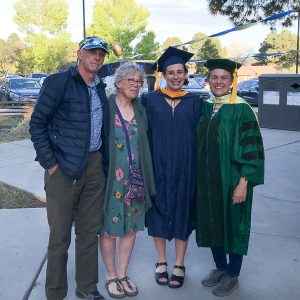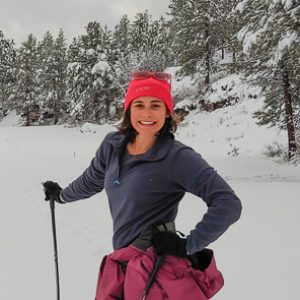Fairness First blog
The Fairness First blog represents a space where researchers share with the broader community why health equity research matters to them, how do they connect to health equity, and what is the value of community engagement in the research process.
September 13, 2023
Introducing Caroline Mende, SHERC’s New Research Coordinator

Caroline Mende is a new Research Coordinator with SHERC’s Community Engagement Core. In this role, Caroline coordinates the Community-Campus Partnership Support Program and the Fairness First Campaign, and is using her background in anthropology to support a cultural consensus modeling project that will examine how people throughout Arizona think about healthy communities and needs.
Caroline recently completed her MA in socio-cultural anthropology with a focus on medical anthropology at NAU. For her thesis research, she looked at how people perceive menopause and how this influences symptoms and experiences of menopause. Prior to moving to Flagstaff in 2021, Caroline lived in Boulder, Colorado for seven years. She grew up in southern Maine and finished her BA in Anthropology in 2014 at St. Mary’s College of Maryland. She is excited to be joining SHERC!
Q. Your educational background is in socio-cultural anthropology with a focus on medical anthropology. How do you see this overlapping with public health?
A. One of my favorite things about anthropology is how cross-disciplinary the field is. The anthropological perspective is insightful in a variety of fields. Medical anthropologists study how culture* influences health and how people understand the human body and illness. Anthropologists also look at culture holistically. This approach helps me think about how social determinants of health** in public health settings interact with each other. The anthropological perspective is particularly useful when thinking about health equity because many inequities – health and otherwise – are socially and culturally informed. I’m also really thankful to my thesis committee at NAU for helping me frame how I think about anthropology and public health!
*In anthropology, culture refers to shared beliefs, values, and ways of living.
**Social determinants of health are non-medical factors – like socioeconomic status, education access, living location – in a person’s environment that influence health.

Q. What does ‘health equity’ or ‘health fairness’ mean to you?
A. To me, health equity means that people have access to quality healthcare, regardless of who they are, where they live, or where they come from. Equitable healthcare includes opportunities for accessing different healthcare choices so that people can choose healthcare that meets their needs. And it’s not just about healthcare. It’s about healthy communities that provide opportunities for people to engage with each other, seek meaningful employment that pays well, and recreate safely – all of the things that help people live healthy lives on a daily basis, outside of needing medical care.
Q. In general, how do you want your work in public health to make a difference or change in this world?
A. This question is tied in with how I see the field of anthropology – as a field that can bridge the gap between traditional academic research and community engagement. I hope my work in public health can contribute to information sharing that helps people live healthier lives that are meaningful to them. As a graduate research assistant at NAU I was the editorial assistant for the journal Practicing Anthropology. This journal focuses on applied research, and I really enjoyed working with authors to share their work – often in language that’s more approachable than typical academic writing.
Communicating health research to the right audiences outside of the academic world is an important step in the research process – particularly when community members are directly involved in or affected by research. There are so many ways to be healthy and I hope I can be a part of advocating for health equity by sharing information more broadly and in accessible ways.
Q. What is one personal reflection you’ve had regarding your journey in public health and health equity advocacy that you are willing to share?
A. After finishing my undergraduate degree, I started a job as an AmeriCorps volunteer with Spirit of the Sun (a Colorado-based organization that facilitates community and economic development work with Indigenous communities around the US). In this role, I worked on a community needs assessment. While this project wasn’t focused on public health and health equity specifically, the biggest takeaway for me was the importance of engaging with community members and understanding needs (and strengths!) from their perspectives. It’s crucial to meet people where they are. I’ve taken this lesson with me, and it is part of the reason I decided to go back to school. In the context of public health, engaging with communities is a key piece of creating programs that work for people.
Q. Tell us about a book you’ve recently enjoyed reading.
A. I just finished reading The Long Way to a Small, Angry Planet by Becky Chambers. I don’t typically like science fiction, but decided to give this book a try when my boyfriend suggested it. I’m glad I did because I really enjoyed the characters. Typically, I like mysteries and enjoyed a long Agatha Christie phase during the pandemic.
Q. Self-care is a vital part of our collective work towards health fairness for all (or health equity). What is one thing you do to make sure you are caring for yourself – emotionally, mentally, physically or spiritually.
A. It’s probably cliché, but staying physically active is important for my physical, mental, and emotional health. My family hiked a lot when I was growing up, but I was definitely not an athletic kid. I didn’t start running – and truly enjoying physical activity – until I went to college and I’m so happy I’ve kept up this habit. Running outdoors helps me enjoy my neighborhood and the trails and landscape around me. It also gives me time to myself. I always feel happier after spending time moving my body and spending time in the sun – although I love rainy and snowy runs (and cross-country skiing) too!
Back to the main Fairness First Campaign page.
